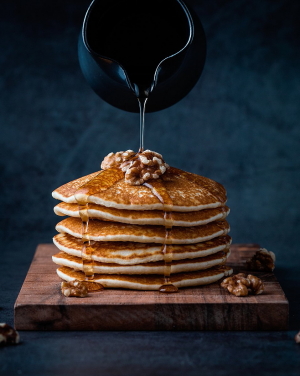
Paczkis for Shrove Tuesday, or Fat Tuesday (Mardi Gras). Photo by Kurman Communications LLC, courtesy of Flickr
TUESDAY, FEBRUARY 13 and WEDNESDAY, FEBRUARY 14: Western Christians officially enter the season of repentance on Ash Wednesday—this year, also Valentine’s Day—following any last indulgences made the day before, on Fat Tuesday, or Mardi Gras.
2024: According to the Catholic News Agency, this year’s convergence of Ash Wednesday and Valentine’s Day has several advantages. “I think the convergence of Ash Wednesday and Valentine’s Day can really show us how we’re supposed to do penance — not only as individuals, but in communion with others, and how our penance is always ordered toward our neighbor,” said Father Dustin Dought, executive director of the Secretariat of Divine Worship for the U.S. Conference of Catholic Bishops (USCCB) (read more here). Father Dought also adds: “So if a couple, say, were to have that [one large] meal in the evening, I think there’s something beautiful about, ‘Oh, I’m having a small breakfast or a small lunch; I’m eating in very small portions throughout my day out of love for God, but also because my beloved and I will enjoy our normal-sized meal together.’”
MARDI GRAS, FAT TUESDAY: PANCAKES & PACZKIS
Traditionally an opportunity for Christian households to cleanse their cupboards of butter and eggs in preparation for Lent, Mardi Gras (literally, “Fat Tuesday”) has evolved far beyond its simple, pancakes-and-paczkis roots. The food-laden traditions of Shrove Tuesday do still exist—in England, pancake races have been held continuously since the 15th century, and doughnut shops worldwide continue to bake millions of paczkis—but the elaborate festivities have morphed into mega-festivals across the globe. Whether it’s Carnival in Brazil, Carnevale in Italy or Mardi Gras in New Orleans, days-long events finally come to a close on Ash Wednesday, as Christians begin the 40 days of Lent.
Recipes! Shrimp gumbo, jambalaya and King Cake can be on your menu, with help from Food Network, Southern Living, Taste of Home and the New York Times.
FROM EPIPHANY TO FAT TUESDAY: CARNIVAL
Epiphany signals the official start of Carnival season, and Montevideo, Uruguay, festivities for Carnival begin in mid-January. In most cities, events typically begin one or two weeks prior to Fat Tuesday, with colorful parades, masquerade dress, festive music and, of course, plenty of sweet and fried breads. Whether it’s the Polish paczki, the English pancake or the Swedish semla, the tradition of using sugar, lard, butter and eggs on Fat Tuesday has as many cultural variations as nations that celebrate.
In the UK and Ireland, the week prior to Ash Wednesday is known as “Shrovetide,” ending on Shrove Tuesday and always involving pancakes. Shrove Tuesday is derived from the word shrive, which means “to confess.” The Christian Mardi Gras began in Medieval Europe, although Venice remains one of the most sought-after destinations for the holiday.
Did you know? “Carnival” derives from the Latin carne levare, which means, “to take away meat.”
Across the world, in Rio de Janeiro, Carnival has become such a massive event—so much so, in fact, that the country attracts 70 percent of its tourists during this time! Mardi Gras came to the United States in 1699, when French explorers Pierre and Jean-Baptiste Le Moyne were sent to defend France’s claim on the territory of Louisiane. Today, Mardi Gras reigns strong in New Orleans.
REPENT AND BEGIN LENT ON ASH WEDNESDAY
In representation of the 40 days that Jesus spent fasting in the desert, most Christians observe the 40 days of Lent (excluding Sundays) in preparation for Easter. On Ash Wednesday, able adults fast and able Christians abstain from meat and practice repentance.
Records indicate that from the earliest centuries, the days preceding Jesus Christ’s death were filled with a solemnity of fasting and penitence. The custom of clergy placing ashes upon the foreheads of the faithful is rooted in the practice of doing so as a sign of mourning and repentance to God; traditionally, palm fronds from the previous year’s Palm Sunday are burned into ashes for Ash Wednesday services, and the ashes are then blessed. The Catholic Church permits ashes on the forehead for anyone who wishes to receive them—not just baptized Catholics—and the practice of ashes is kept by Catholics, Lutherans, Methodists and Anglicans.





